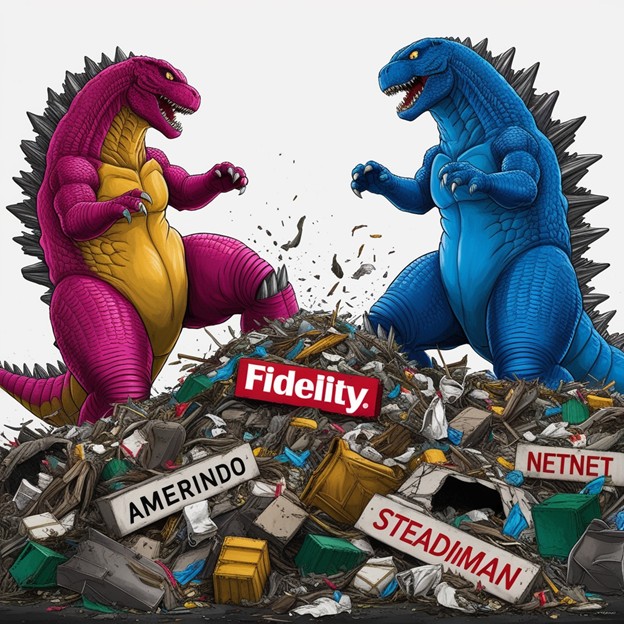FundAlarm (1996-2011), for which I penned a month-to-month column, was the positioning that gave rise to MFO. I used to be drawn to Fund Alarm way back by the voice of its founder, Roy Weitz. In the course of the lunatic optimism and opportunism of the Nineties (who now remembers Alberto Vilar, the NetNet and Nothing-but-Internet funds, or mutual funds that clocked 200-300% annual returns?), Mr. Weitz and Morningstar’s John Rekenthaler spent quite a lot of time kicking over piles of trash – typically piles that had attracted lots of of hundreds of thousands of {dollars} from worshipful innocents. John had higher statistical analyses, and Roy had higher snarky graphics.
On the finish of 2000, John shifted his consideration from columnizing to Directing Research. He returned to writing a every day column in 2013, which he billed as an try to leverage his quarter century within the trade to “put at this time’s funding tales into perspective.” Reasonably than one thing mildly anodyne, John supplied up “Die, Horse, Die!”
Roy and John represented, for me, two beliefs: very good individuals who cared deeply sufficient to be indignant, aggravated, often outraged, and vigilant in your behalf whereas being clear-eyed sufficient to know that every of us was the co-author of our personal misfortunes. As traders, we would like wizards to resolve our issues. As an trade, they had been keen to fabricate wizards for us.
“[I]nnovation in bond funds is a nasty factor. Bond funds are greatest served easy …”
John Rekenthaler joined Morningstar in 1988, virtually by happenstance. He was finding out Shakespeare in grad college at Chicago, burned out after a yr, and reconnected with Don Phillips who had additionally accomplished an M.A. in literature there earlier than launching Morningstar. John joined because the agency’s first analyst. He introduced his retirement from it on November 12, 2024, in a column entitled “Farewell (for Now).”
In 1988, the fund trade felt beholden to nobody, and details about funds was restricted to regardless of the advertising and marketing division selected to share, nevertheless they selected to share it. His influence was rapid and foundational. Along with Don Phillips, he co-created the Morningstar Model Field in 1992, a software that basically modified how traders perceive and classify mutual funds. As Morningstar’s Director of Analysis and later Vice President of Analysis, he helped develop the class classification system that turned an trade customary. These weren’t merely technical improvements – they had been revolutionary steps towards democratizing funding information. They created a multibillion-dollar agency that originally held a multi-trillion-dollar trade to account, and extra just lately created the spectacularly difficult function of each watchman of the trade and lively member of it. The agency now oversees greater than $300 billion in belongings.
“I was extra gullible. Knowledge on this enterprise means turning into much less trusting.”
However maybe Rekenthaler’s best contribution has been his voice. If Christine Benz is true (“To learn John is to know him”), I do know him nicely as a result of I’ve learn his work and admired his edge. Rekenthaler’s legacy extends past particular improvements or insights. He preaches what William Bernstein calls Rekenthaler’s Rule: “If the bozos learn about it, it doesn’t work anymore.” (I believe we’re the “bozos” in query.) His colleagues appear to distill his writing into the adage, “don’t attempt to get cute and don’t purchase their crap. Create a portfolio no extra advanced than vital, executed as economically as potential, then get on with life.”
Mr. Rekenthaler helped create a world the place impartial considering in funding evaluation isn’t simply potential – it’s anticipated. As John Tipton displays, he embodied Morningstar’s core values of “readability, honesty, and advocacy on behalf of traders.” In doing so, he didn’t simply serve traders; he confirmed them learn how to assume higher about investing.
David Harrell, Morningstar’s Editorial Director, remembers a memorable change with John:
“When John employed me as a younger, inexperienced fund analyst over 30 years in the past, I mentioned one thing about passing the troublesome writing check. He mentioned, ‘Oh, you didn’t, however you failed much less badly than others.’”
Backside Line
It’s simple to be a skeptic about what others imagine. It’s much more daunting, and much more helpful, to be a skeptic about what you your self imagine. Curiosity helps. A willingness to study arduous issues helps. Instructing it helps. Being immersed in it helps. Standing outdoors the sport – not seeing each scenario as one the place you win or lose – helps. And a quiet self-confidence, having the interior peace to know what you might be greater than the sum of your errors, helps.
Thanks, good sir, for instructing us.
– – – – –
“Once I started at Morningstar, outdoors of Constancy Magellan, which legitimately was in style as a result of it had a implausible observe report and historical past of success, the most important mutual funds had been funds known as government-plus bond funds. Authorities-plus bond funds don’t exist any longer, which tells you the way good they had been”
“I imagine future returns will certainly fail to match these of the previous. However I make that assertion guardedly. Simply as there have been extra issues on heaven and earth that had been dreamt of in my predecessors’ philosophies, Horatio, the inventory market’s prospects additionally exceed my creativeness.”


